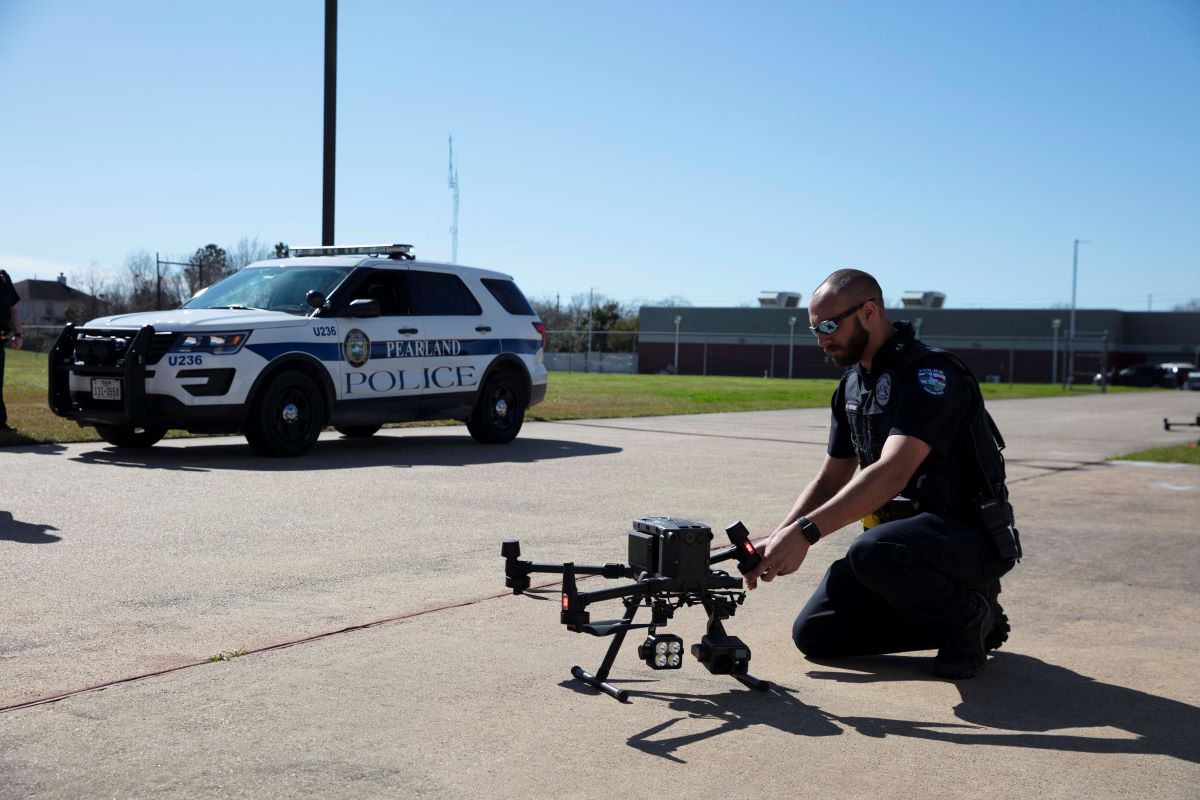
The most recent in a long series of US government agency and legislative initiatives to squeeze DJI drones from the domestic market targets a critical user category in particular: lifesaving first responder organizations. Given the literally existential stakes that the bill poses, DJI has responded with a detailed arguments against its eventual passage into law.
The “Drones for First Responders (DFR) Act” was tabled last week by the same House of Representative members pushing the pre-existing Countering CCP Drones Act.” If passed, the latter measure would effectively ban operation of UAVs made in China in the US—including hundreds of thousands by market leader DJI in user by consumers and companies.
Given the enormous market- and competition-deforming effects passage of that text would have – which increase the odds it could fail – its backers apparently decided to hedge their bets by introducing the new legislation. The new text would slap a 30% tariff on drones from China; increase those taxes by 10% annually; and ban imports of drones containing Chinese-made components by 2030. And it claims to do so in the interest of first responders, who have made it clear they want no part of it.
The bill’s protectionist carrot tied to that market-banishing club proposes providing funds to various US drone users – particularly first responders – to underwrite purchases of American alternatives when surtaxed DJI drones become too expensive, or are simply banned from operation.
The bill’s conceit of defending the interests of first responders by denying them DJI drones that the vast majority use has prodded the company to issue a rare response.
In doing so, the Shenzhen-based firm not only again refutes unsubstantiated claims attending all blacklisting efforts that its craft leak data to state servers in China. It also cites Congressional testimony given in hearings last week by police, fire, and emergency medical service commanders of drone units reiterating points they’ve made opposing earlier federal and state bans: that DJI drones and onboard tech are currently superior to any US option, and are far more affordable.
Forcing first responders to buy other craft – and even using taxpayer money to offset the higher costs of US alternatives – would mean flying less effective and reliable UAVs, and putting people’s lives in peril, the officials testified.
In responding to the “Drones for First Responders (DFR) Act” in the wake of those testimonies, DJI made the following points:
Data Safety: DJI refutes underlying allegations user data is leaked from its craft, and points out its drones can be configured to operate without transmitting information they collect until hardwired directly to user computers. It has also offered resources for users to further enhance their security. Meantime, US drones using similar communications tech would logically also be accused of representing the same data leaking risk – were that a politically useful claim to air.
To level that playfield and ensure the security of all UAV users, the company urges Congress to call on “experts to establish a clear list of technology-based performance standards that apply to all drone manufacturers,” rather simply assume “product’s security on country-of-origin” basis.
Legislative Consequences for Users: DJI also notes officials told Congress the law would “force first responders to purchase drones that limit their operational capabilities,” thereby putting their own safety and the lives of victims at greater risk. The reason? As DJI notes, those first responder commanders “acknowledged several times at the hearing that the US industry is not yet ready to provide comparable quality or features, and that the reality on the ground is that drones fulfill a critical need of public safety end users.”
Then there’s the bottom-line effects of the bill imposing and increasing tariffs: pricing DJI drones out of the market; leaving users with no options but to buy more expensive US craft; and taxpayers shelling out de facto subsidies to those domestic manufacturers in the form of payments to certain operators encouraged to buy American. But what about the countless enterprise operators whose limited budgets won’t benefit from that largesse?
“A survey of drone service providers showed that two-thirds believe they would go out of business if they did not have access to drones manufactured in China,” DJI wrote. “This will devastate the American drone ecosystem risking at least $116 billion in economic activity and 450,000 American jobs supported by the use of DJI products.”
Undermining US Drone Development: DJI’s domination of US and global markets is another target of recent US legislative attacks – one free marketers ironically seek to address through anti-competitive protectionism.
DJI notes it gained that leadership by being first to market “a drone with an unprecedented combination of stability, power and reliability.” It says it has since used its “first-mover advantage and commitment to innovation, research, and development that allowed DJI to lead the industry,” to continually raise the tech and performance for the entire sector. It does so by dedicating fully 25% of its workforce entirely to product development.
The company argues that the cascading prohibitions and pending bills seeking to push it out of the US market would have the opposite effect on future development of the American drone sector that’s sought they. Rather than increase sales in the absence of DJI drones on shelves, the company says its American competitors and third-party developers would have little incentive to up their game.
“We have supported the local commercial drone industry for years, in particular US drone software start-ups and service providers,” the company writes. “We also believe that competition breeds innovation, and kicking DJI out of the US market on baseless allegations does not benefit anyone – especially not the first responders who need reliable, safe and robust drone platforms the most.”
FTC: We use income earning auto affiliate links. More.




Comments